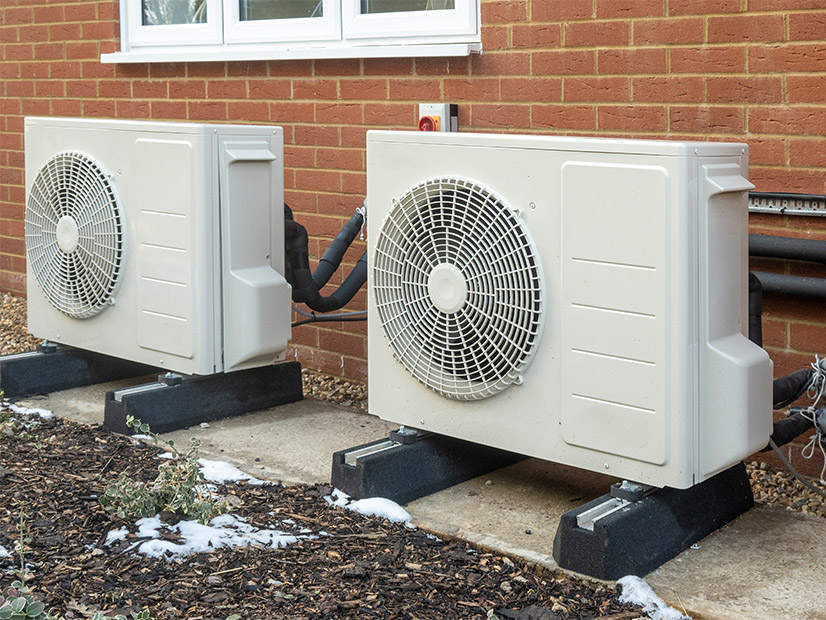The role of renewable natural gas (RNG) and hydrogen in decarbonizing Massachusetts’ heating sector has been a major topic of debate for several years, with major implications for the state’s gas network and electrical grid.
Questions about alternative fuels were a major focus of the Department of Public Utilities’ three-plus-year investigation into the future of gas in Massachusetts, which ultimately concluded that the state’s gas utilities should not be able to recover costs associated with blending RNG or hydrogen into the gas supply from the general rate base (DPU 20-80). (See Massachusetts Moves to Limit New Gas Infrastructure.)
Despite the DPU’s order, arguments over alternative fuels have remained a main point of contention in the Department of Environmental Protection’s (DEP) development of a “clean heat standard” (CHS), a program aimed at incentivizing emissions reductions from the state’s buildings sector.
As proposed, the standard would apply to suppliers of heating energy at the retail level, including suppliers of oil, propane, natural gas and electricity. Residential suppliers would be required to obtain two types of credits — for full electrification projects and for emissions reductions — with the requirements increasing over time to keep up with state’s electrification and decarbonization goals.
Suppliers could meet the requirements by embarking on projects themselves, purchasing credits associated with other projects or making alternative compliance payments (ACPs).
In a reflection of the complexity of the program and the significant impacts it could have for the state’s clean energy transition, several questions have emerged in the stakeholder engagement process:
How should credit requirements be allocated between different suppliers? How should the state measure emissions reductions? What is the role of ACPs? How should the program work for industrial and commercial heating? And, finally, what heating technologies should be eligible to generate credits, and therefore be incentivized by the program?
In the draft framework released by the DEP in the fall, hydrogen and RNG are not eligible to generate credits, due to the state’s aim at focusing the CHS on incentivizing electrification. This direction was met with applause from climate advocacy organizations and outcry from industry and utility-aligned groups.
“We are surprised and concerned that the Draft CHS Framework does not include any crediting for renewable gaseous fuels as part of Massachusetts’ building decarbonization solution,” commented the Coalition for Renewable Natural Gas, whose membership includes several of the state’s gas utilities, RNG producers and fossil fuel companies.
“The portions of the gas system which currently serve the residential and commercial customers targeted for electrification will remain in place for a very long time, even with aggressive fuel-switching policies, and would be well-served by increasing renewable gases while that transition occurs,” the RNG coalition wrote.
Other companies and industry groups, including the American Biogas Council, the American Public Gas Association, the Associated Industries of Massachusetts and the Mass Coalition for Sustainable Energy, opposed the exclusion of alternative gases from credit generation.
Meanwhile, the omission of hydrogen and RNG from the program was praised by climate and environmental organizations, which have opposed policies that incentivize blending alternative fuels into the gas system.
“The ineligibility of gaseous biofuels and hydrogen under the CHS is absolutely essential for keeping the commonwealth on the most cost-effective trajectory towards building decarbonization,” wrote the Acadia Center.
Environmental organizations in the state have long expressed concerns that electrification is the most efficient pathway to decarbonizing the building sector and that blending alternative fuels into the gas network would deliver minimal climate and public health benefits at a high cost to gas ratepayers.
The Acadia Center made the case that making hydrogen and RNG blending eligible to generate credits would be in “direct conflict” with the DPU’s 20-80 Order on gas system decarbonization.
In the order, the DPU wrote that it “rejects the recommendation to change its current gas supply procurement policy to support the addition of renewable natural gas to LDC supply portfolios due to concerns regarding the costs and availability of RNG, as well as its uncertain status as zero-emissions fuel.”
The DPU added that gas system upgrades to support the blending of alternatives fuels must be entirely funded by the customers that procure the alternatives, instead of the general rate base.
The DEP said in a statement it’s committed to ensuring the standard is “consistent with the goals of DPU 20-80,” as well as the state’s existing Mass Save energy efficiency program. Energy efficiency measures are not eligible for clean heat credits “to avoid unnecessary complexity and redundancy with the Mass Save program.”
Under the draft framework, certain liquid biofuels would be eligible for the emission reduction credits. Waste-based biofuels that are eligible for the state’s Alternative Portfolio Standard would receive full credits, while fuels that are eligible only for the federal Renewable Fuels Standard would receive a half credit. As proposed, this half credit would end in 2030.
As with hydrogen and RNG, the biofuel industry has pushed to expand the range of fuels that are eligible for credits, while environmental groups have argued for tighter constraints around what fuels can be considered. Wood heating also would not be eligible for credits, drawing the ire of the wood pellet industry.
The DEP has indicated that “no final decisions have been made” on the CHS and is considering public feedback on all aspects of the standard. The department has committed to revisiting the credit eligibility of different heating options at the 2028 program review.
Beyond questions about credit eligibility, the proposed credit requirements for electricity suppliers have been met with pushback from both the utilities and environmental organizations, which have argued these obligations could undermine incentives for consumers to adopt heat pumps.
“As constructed, the framework will likely increase electric rates, increasing operating costs of electric heat, which is counterproductive to the commonwealth’s electrification goals,” Eversource commented.
The DEP is aiming to release a formal draft proposal of the CHS in the fall and has two stakeholder meetings scheduled in early April, along with a comment deadline April 5.




